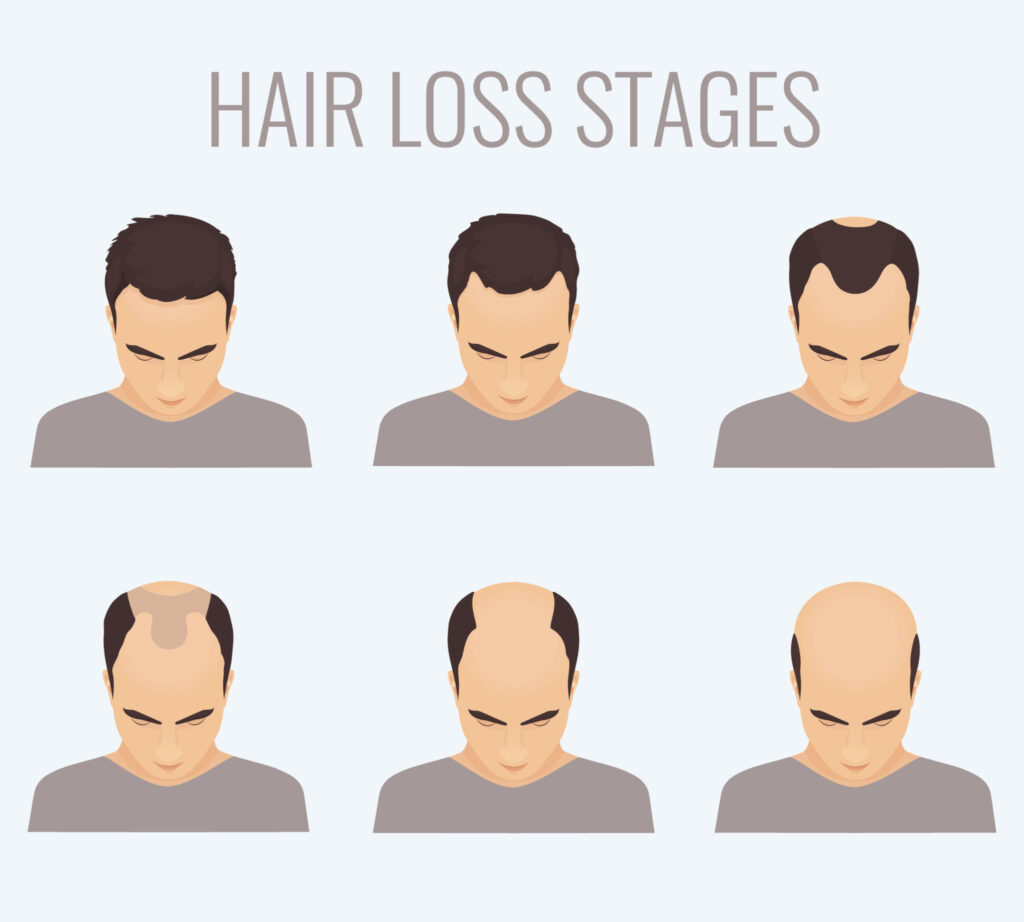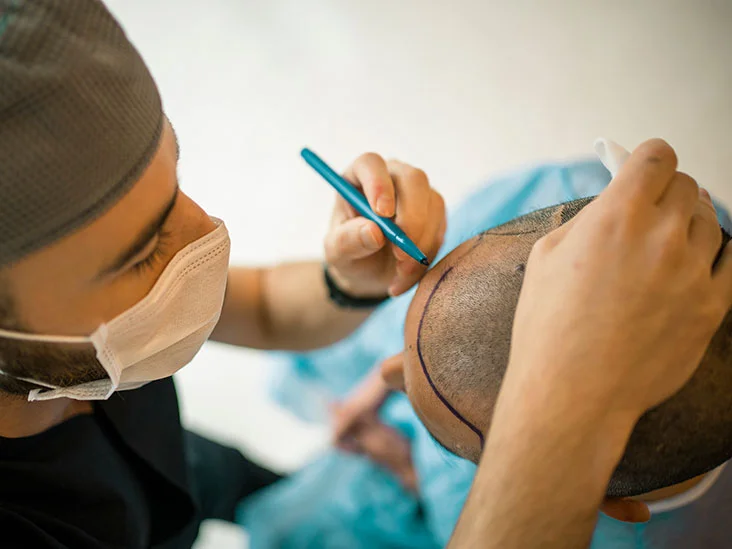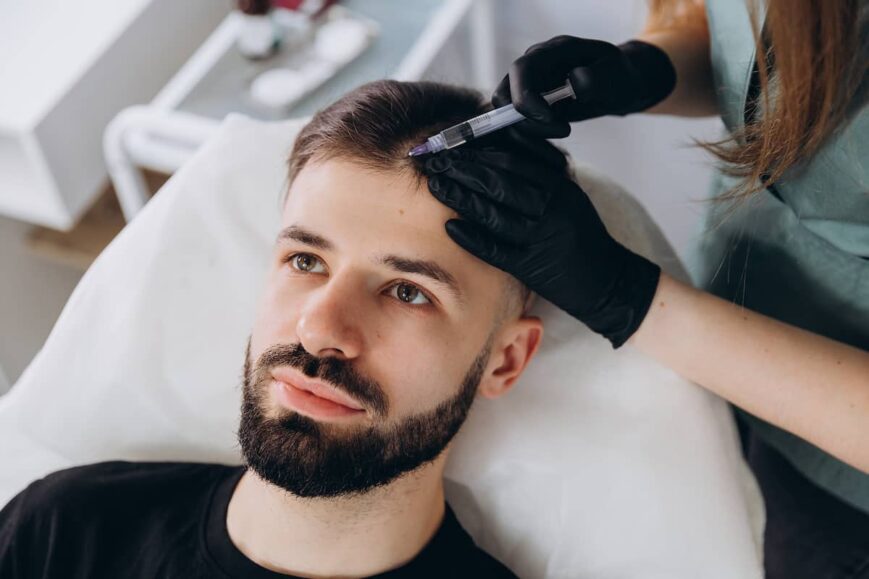Hair loss affects millions of men worldwide. It’s not just a physical phenomenon but also an emotional one, deeply intertwined with self-image and societal perceptions of masculinity. For many, the onset of hair thinning or balding can significantly impact self-esteem and confidence, affecting various aspects of life, from personal relationships to professional opportunities.
Investigate the many hair loss treatments for men. We’ll look at the suitability, availability, and effectiveness of a variety of treatments, from over-the-counter medications to state-of-the-art surgical treatments.
Our goal is to provide men with a comprehensive guide that will empower them to take charge of their hair loss and manage it in a straightforward and positive way.
While hair loss can affect individuals of all ages, including men, women, and teenagers, it has distinct causes and symptoms. Due to the fact that Hair Loss in Teenagers often indicates underlying medical issues or genetic predispositions, teenagers may be particularly susceptible. Inadequate diet, stress, hormone swings, and medical conditions are common contributing variables.
Understanding Hair Loss

Male baldness, known as androgenic alopecia, is mainly caused by hormones and heredity. A receding hairline and thinning crown are the condition’s hallmarks, eventually giving way to a horseshoe-shaped hair pattern across the sides and back of the head. The main culprit is dihydrotestosterone (DHT), a derivative of the hormone testosterone in men. DHT shortens the period each hair grows, eventually leading to hair loss via shrinking hair follicles.
However, genetics and hormones aren’t the only factors at play. A combination of other elements can contribute to or exacerbate hair loss:
Determining the best course of action for hair loss treatments for men requires an awareness of the underlying reasons for hair loss. People should speak with medical experts to pinpoint the precise causes of their hair loss and create a customised management and hair loss treatments for men plan.
Over-the-Counter Hair Loss Treatments for Men

Best hair loss treatments for men include various options, each with benefits and considerations.
- Minoxidil (Rogaine): Minoxidil, commonly known as Rogaine, is an over-the-counter medication widely used to treat hair loss. It’s available in various formulations, including a 2% and 5% liquid solution and a 5% foam.
- Finasteride: Another FDA-approved drug for hair loss, often used in conjunction with Minoxidil for enhanced results.
Prescription Medications
Propecia Proscar, Finasteride One of the main medications used to treat male design baldness or androgenic alopecia is Finasteride. It is prescribed. It controls the conversion of testosterone into dihydrotestosterone (DHT) by the enzyme 5-alpha reductase. The hormone DHT shrinks hair follicles, resulting in hair loss. Finasteride can help halt hair loss and, in certain situations, even encourage hair regeneration by reducing DHT levels.
- Obtaining a Prescription To obtain Finasteride, one must first consult with a healthcare provider. The process typically involves:
- You are discuss your hair loss concerns and medical history with a doctor.
- It is undergoing a physical examination, if necessary.
- If deemed appropriate, the doctor will prescribe Finasteride.
Potential Side Effects While Finasteride is effective for Finasteride, it has side effects. Common side effects include:
- Decreased libido
- Difficulty in achieving an erection
- Ejaculation disorders
- Increase in breast size and tenderness
- Skin rash
- In rare cases, more severe side results may occur, and some sexual side effects may continue after Finasteride stops the medication. Discussing all potential side effects with a healthcare provider before starting Finasteride is crucial.
Remember, while Finasteride is a widely used and effective hair loss treatments for men, it’s essential to use it under the direction of a healthcare professional to ensure it’s appropriate for your specific situation.
Surgical Hair Loss Treatments for Men

Synopsis of Hair Transplant Methodologies Hair follicles from a section of the body known as the “donor site” are transferred to the balding area of the head known as the “recipient site” during hair transplant surgery. Male pattern baldness is the primary condition it treats. There are two methods for hair transplants with Finasteride: (Follicular Unit Transplantation and Follicular Unit Extraction) FUT and FUE.
- Follicular Unit Transplantation (FUT): This procedure includes dividing a donor area skin strip containing hair follicles into separate grafts.
- Follicular Unit Extraction(FUE): Direct extraction of individual hair follicles from the donor location and subsequent implantation into the recipient site.
- Benefits of Hair Transplants
Improved Self-Esteem: Restoring hair can significantly boost confidence and self-image.
- Risks Associated with Hair Transplants
When considering a hair transplant, it’s crucial to speak with a licensed surgeon to discuss these details and determine if this procedure is the best choice.
Laser hair Therapy Hair Loss treatments for men
The Operation of Laser Treatments Low-Level Laser Therapy (LLLT), another name for laser treatments for hair loss, uses particular light wavelengths to stimulate and encourage the growth of hair follicles. Photons are irradiated into the scalp tissues during the procedure, known as cold laser therapy or red light therapy. Weak cells absorb these photons, which promote hair development by increasing circulation and cellular activity.
How well laser therapy works While promising, the efficacy of laser hair loss treatments for men remains debatable. Good outcomes have been noted in a number of studies; one such study from 2014 found that LT is safe and effective in encouraging hair growth in both men and women.
According to a 2013 study, men’s hair growth increased by 39% over the course of 16 weeks for those between the ages of 18 and 48. To establish long-term safety and effectiveness, more research is required because results may vary.
Accessibility and Cost Laser treatments can be accessed in various forms, including in-office procedures, at-home devices like laser caps and combs, and larger devices used in salons and clinics.
PRP therapy is an advanced option for hair loss treatments for men. This involves injecting platelet-rich plasma into the scalp to stimulate hair follicles and promote hair growth.
Lifestyle Changes and Natural Remedies

Lifestyle Modifications to Reduce Hair Loss Making specific lifestyle changes can potentially reduce hair loss:
While some studies suggest benefits from supplements like biotin, zinc, and omega fatty acids, the effectiveness can vary widely among individuals. It’s important to note that these remedies and supplements may take a few months to yield noticeable results and are not a substitute for medical treatments. It would help if you spoke with a healthcare professional to ensure your chosen techniques are secure and suitable for your circumstances.
Remember, while lifestyle changes and natural remedies can contribute to hair health, they should be part of a holistic approach that includes medical advice and treatment when necessary.
Emerging Treatments and Research
The field of treating hair loss is constantly changing as new studies and possible remedies are discovered regularly. The following are a few recent developments:
Importance of FDA Approval and Clinical Trials
FDA approval is crucial for ensuring that new treatments are safe and effective for public use. It involves a rigorous process of clinical trials, which are essential for:
- Evaluating Safety and Efficacy: Clinical trials are designed to test new treatments under controlled conditions to ensure their safety and effectiveness.
- Monitoring Side Effects: These trials also monitor for any potential side effects, ensuring that the benefits of a treatment outweigh the risks.
- Establishing Dosage and Administration Guidelines: The appropriate dosages and administration methods are determined through clinical trials.
- Clinical trials are the backbone of treatment development, providing the necessary data to make informed decisions about the potential of new therapies. They are a critical step from the research lab to the patient’s treatment plan.
- The sources provided provide more detailed information on these emerging treatments and the role of FDA approval and clinical trials.
Getting expert assistance is crucial if you are experiencing severe hair loss. Customized hair loss therapies for men can be recommended by a dermatologist or trichologist, who can also identify the underlying reason of your hair loss.
Conclusion
Hair loss in Men is a multifaceted issue that can stem from genetic, hormonal, or lifestyle factors. While it’s a common concern, the good news is that there are several effective treatments available:
Medications such as Minoxidil and Finasteride have been shown to decrease hair loss and, in some circumstances, restore hair.
Hair loss treatments for men like FUT and FUE can be permanently treated with surgical solutions like hair transplants.
For individuals seeking less invasive treatments, alternative methods such as herbal remedies and laser hair loss treatments for men can be highly appealing.
Lifestyle modifications like diet and stress management are essential for maintaining general hair health.
Each treatment has its considerations, and what works for one person may not work for another. Therefore, consulting with healthcare specialists who can offer personalized treatment plans tailored to your specific needs and circumstances is essential.
Embarking on the journey to hair restoration is personal, and it’s essential to approach it with patience and an open mind. Advances in medical science continue to enhance the options available, offering hope and solutions to those affected by hair loss. Remember, the goal is to restore hair, bolster confidence and improve quality of life.
FAQs for Hair Loss Treatments for Men
How much hair loss is average per day?
It’s normal for men to lose about 50-100 hairs daily. Excessive hair loss or visible thinning may indicate a need for treatment.
Can wearing a helmet or hat increase hair loss problems?
No scientific evidence suggests that wearing helmets or hats contributes to hair loss. Genetic factors primarily cause hair loss.
What are the most valuable hair loss treatments for men?
The FDA has approved Minoxidil (Rogaine) and Finasteride (Propecia, Proscar) as treatments for male pattern baldness. Hair transplants and laser hair loss treatments for men are also effective options.
How long does it take for hair loss treatments for men to work?
Treatments like Minoxidil can take 4–6 months to show results, and it’s essential to use them consistently as directed.
Are there any side effects to hair loss remedies?
Yes, medications like Finasteride can have side effects. It’s necessary to discuss these with a healthcare provider before starting treatment.
Is there any chance of recurrence of baldness in the same treatment area?
After a hair transplant, the transplanted hair is generally permanent. However, Finasteride can continue in other areas, so ongoing treatment may be necessary.
Can natural remedies effectively treat hair loss treatment for men?
While some natural remedies may provide benefits for hair health, their effectiveness is not as well-documented as medical treatments. Always consult with a healthcare professional.
Do lifestyle changes help with hair loss?
In addition to potentially reducing hair loss, a good diet, consistent exercise, and stress reduction can significantly affect overall hair health.

